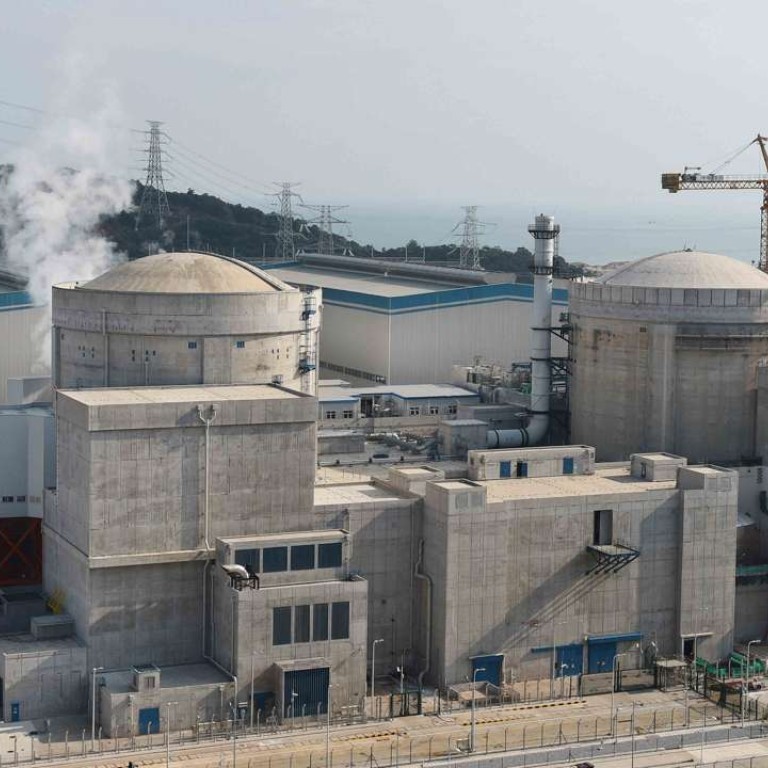
China’s nuclear error and cover-up unlikely to hurt reactor exports, industry competitiveness
Short-term events will not impinge on long-term prospects as country has credible track record, say industry experts
The operational blunder and subsequent cover-up attempt by staffers at one of mainland China’s nuclear power plants revealed by the authorities earlier this month will not dent the nation’s strategy to export reactors and has no direct implication on its competitiveness, according to industry experts.
George Borovas, a Tokyo-based partner and head of global nuclear group at international law firm Shearman & Sterling who has advised importers, exporters and governments on the development of nuclear projects, said he did not see any direct ramification from the operational non-compliance incident in the Yangjiang nuclear plant on China’s competitiveness as a reactor exporter.
“There is a difference between a staff operational issue at a plant in the domestic market and the safety and quality of nuclear equipment for exports,” he told the Post. “Having said that, given safety is paramount in the industry … how the regulator and operator develop a post-incident response to ensure transparency and the sharing of lessons learned is important [for the industry’s reputation].”
“From a global perspective, safety culture is a foundational principle of the nuclear industry where properly reporting and addressing safety issues in a transparent manner is essential.”
Four operators at the Yangjiang nuclear power plant in Guangdong province some 220 kilometres west of Hong Kong have been punished, for breaching operational guidelines and trying to cover up their errors by failing to record it as required, the ministry of environmental protection said on August 5, over a year after the incident happened.
The team leader lost his senior operator’s licence and was moved to a less sensitive post, while the remaining three received warnings.
Although the incident did not result in a radioactive leak or pose a direct public safety threat, since it happened when the generating unit was under maintenance, the error and its cover-up has raised concerns on the quality of management and plant technician shortage of mainland China’s nuclear industry.
Lin Boqiang, director of the China Centre for Energy Economics Research at Xiamen University, said Beijing’s overseas push for nuclear reactor exports is a long term strategy that would not be swayed by short term events.
“China’s competitive advantages in production of nuclear reactors is very clear, it is the only country with a track record of mass production in the last two decades,” he said. “The go-abroad strategy is natural and a must-go path.”
The plant’s owner China General Nuclear Power Corp (CGN) said it conducted “thorough analysis and a deep review” after the incident was discovered during “self-assessment” in February, and has initiated a “safety culture re-education” programme for all employees.
It added that it had reported it to the ministry’s nuclear safety bureau “in a timely manner” for the sake of “credibility and transparency”.
China General Nuclear Power Corp, whose pipeline of reactors under construction is the world’s largest and primarily located in China, has been eyeing opportunities to build nuclear plants in 13 nations in Southeast Asia, Eastern Europe and Africa.
CGN last September signed a memorandum of understanding with the government of Kenya in east Africa on the potential construction of a nuclear plant using the Chinese Hualong One reactor design, after winning a bid late 2014 to build a nuclear plant in Romania using Canadian reactor technology.
But in Britain, its prospect of taking a substantial stake in a major proposed nuclear project using French technology, that could lead to the export of another reactor based on Chinese design further down the road, has been endangered by British national security concerns.
London late last month put on hold its final decision on the Hinkley Point project in the UK until autumn, a day before a binding investment agreement was due to be signed, saying it needed more time to review the project.
The primary reason for the delay was security concerns over Chinese ownership of the key energy infrastructure that could potentially supply 7 per cent of Britain’s power demand, a BBC report said.

